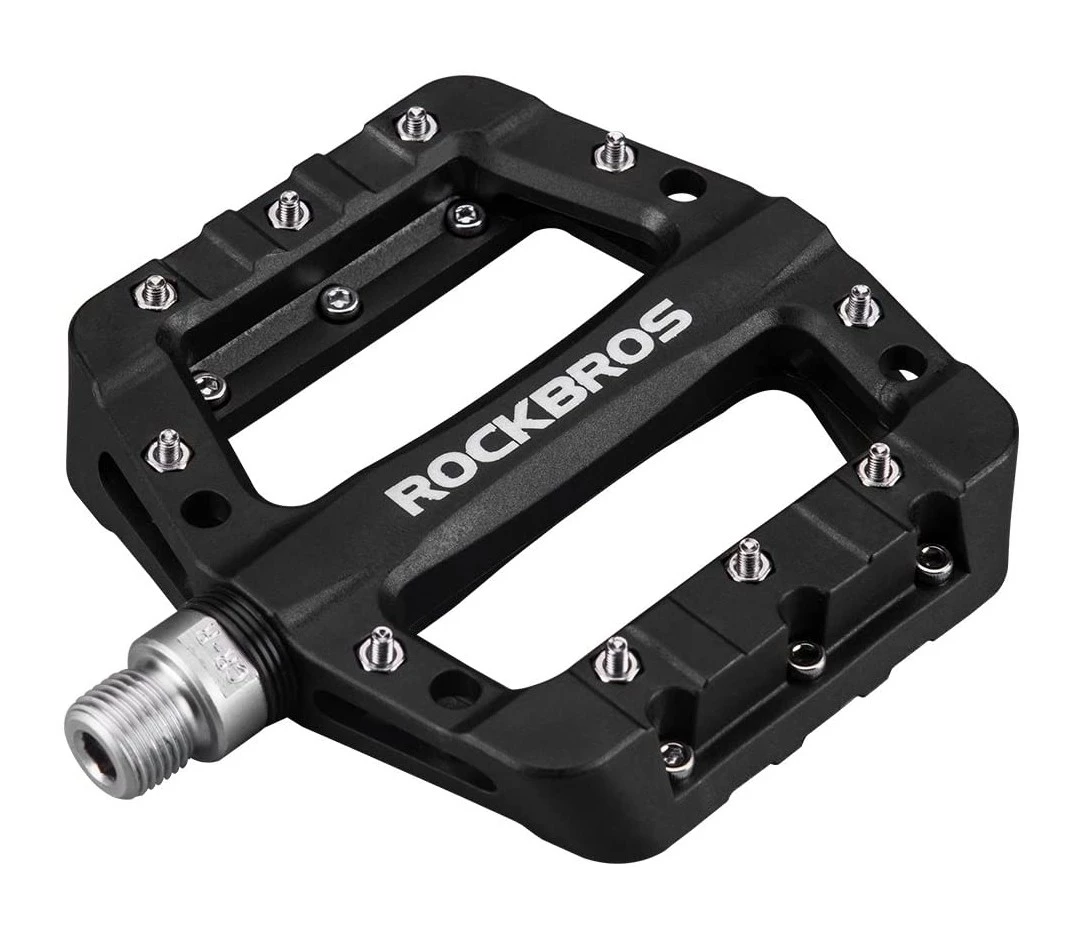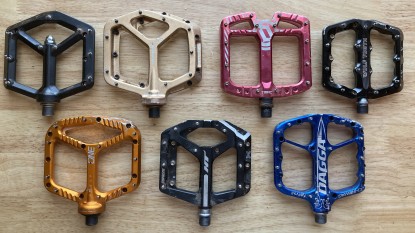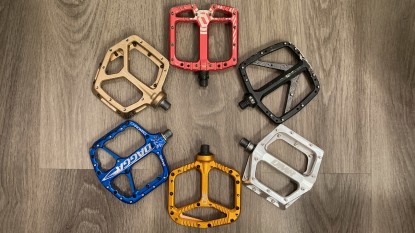RockBros Nylon Fiber Review
Our Verdict
Compare to Similar Products
 This Product
RockBros Nylon Fiber | |||||
|---|---|---|---|---|---|
| Awards | Best Pedal for your Buck | Best On A Tight Budget | Best For Everyday Commuting | ||
| Price | $37 List $24.89 at Amazon | $29.73 at REI Compare at 4 sellers | $27 List $21.24 at Amazon | $22 List $23.98 at Amazon | $30 List $26.99 at Amazon |
Overall Score  |
|||||
| Star Rating | |||||
| Bottom Line | A very inexpensive flat pedal that won't break the bank and delivers serviceable performance | Less-expensive flat pedal option for those who like to put their equipment to the test | A budget oriented pedal that offers adequate grip and a midsize platform but may be less apealing compared to established brands | An inexpensive pedal that works great as a commuter, but less suitable as a true mountain bike pedal | Does not match up with similar priced budget pedals in terms of grip and mobility but still finds value within commuter style applications |
| Rating Categories | RockBros Nylon Fiber | Race Face Chester | Fooker Nylon Fiber | CXWXC CX-930 Pedals | RockBros CNC Aluminum |
| Grip and Traction (25%) | |||||
| Platform (25%) | |||||
| Mobility (20%) | |||||
| Servicing (15%) | |||||
| Weight (15%) | |||||
| Specifications | RockBros Nylon Fiber | Race Face Chester | Fooker Nylon Fiber | CXWXC CX-930 Pedals | RockBros CNC Aluminum |
| Measured Weight (per pair) | 367 g | 358 g | 370 g | 365 g | 301 g |
| Traction Pins (per side) | 10, 2.5 mm hex head bottom loading | 8, 2.5 mm hex head bottom loading | 8, 2.5 mm hex head bottom loading | 8, e4 torx top loading | 8, e4 torx socket top loading |
| Measured Platform Dimensions (millimeters) | 99 mm x 99 mm | 110 mm x 101 mm | 110 mm x 100 mm | 104 mm x 102 mm | 99 mm x 94 mm |
| Platform Profile (millimeters) - not including pins | 16.25 mm at leading edge, 14 mm at axle | 14 mm leading and trailing edges, 17 mm center of spindle | 14 mm at edges, 18 mm at axle | 15.5 mm at edge, 18mm at axle | 9 mm at edges, 17 mm at axle |
| Concavity | 2.25 mm difference from effective edges to axle | 3 mm difference from effective edges to center of pedal | 4 mm difference from effective edge to center of pedal | 5mm difference from effective edge to center of pedal | 8 mm difference from effective edge to center of pedal |
| Q Factor / Distance from cranks to furthest pin | 103 mm | 103 mm | 103 mm | 104 mm | 102 mm |
| Bearings | "High-Speed Bearings" | Cartridge bearings and DU bushings | 3 sealed cartridge bearings | sealed cartridge bearing | Sealed bearings |
| Body Material | Nylon + Molybdenum Steel | Nylon Composite | Nylon Fiber | CNC Aluminum | CNC Aluminum |
| Pedal Wrench Type | 15 mm pedal spanner, 6 mm hex | 15 mm pedal spanner, 8 mm hex | 8 mm hex | 8 mm hex | 6mm hex |
Our Analysis and Test Results
The RockBros Nylon Fiber pedals were a pleasant surprise for testers. When dealing with brands that haven't quite established themselves in the bike industry, there can be a clear sense of skepticism. The extremely low price didn't do much to help our preconceived notions. Once we finally got out on the trail, we found the RockBros pedals functional and effective. No, they never challenged top contenders in any performance metric, and one might describe the on-trail performance as forgettable. You'll appreciate their serviceable performance if you're on a shoestring budget.
Grip/Traction
The RockBros Nylon Fiber pedals delivered average levels of grip. These pedals never felt ultra-tacky, but our feet stayed on these pedals well enough. Two different testers used these pedals. One tester rode Specialized 2FO shoes with SlipNot rubber, and one had Bontrager Flatline shoes with Vibram soles.
These pedals feature ten pins on each side. The pins load from the bottom of the pedal and protrude approximately 4mm from the pedal. They are positioned around the perimeter of the platform, and there is a dead space in the middle of the pedal along the spindle. When focusing on charging the trail and proper form, testers found these pedals to offer passable levels of grip. We descended the gnarliest rock gardens and came out on the other side.
The RockBros pedals were exposed a bit on the climbs. Mellow fire road grinds or super buffed-out singletrack presented no issues. That said, the technical and punchy climbs were less pleasant. On tricky tech moves requiring a lot of body language, our feet bounced about and came off the pedals more easily than others.
Platform
The RockBros pedals have a platform that measures 99mm x 99mm. They have a slightly concave shape, with the leading edge of the platform at 16.25 mm thick, while the platform at the axle is 14mm. The distance from the crank arm to the furthest outboard pin is 103mm. The pedal is constructed of nylon fiber, a type of plastic.
The platform is slightly smaller than most of the competition and significantly smaller than the largest options. One of our testers has size 11 shoes and felt the smaller platform size was noticeable. Compared to the largest platforms in the review, these pedals are about 16mm shorter in the fore/aft direction. Testers could always get their feet back on the pedals in a hurry on the trail. However, finding a good foot position on the fly was noticeably difficult. The tester with larger feet noted that it often felt like a good portion of his shoe was hanging off the side of the pedal.
This pedal has a concave shape. It is 2.25-mm thinner in the middle of the platform compared to the edges. This is a matter of preference, as some pedals are flat while others are convex. Testers agree that there are a lot of benefits to a concave shape. Unfortunately for RockBros, we feel the platform is too small to reap the full benefits of a concavity. Your shoe can't fit the pedal's shape because the pin placement is questionable, and everything is packed into a small space.
These Nylon Fiber pedals are quite thick. At 16.25mm at the leading edges, they are among the chunkier pedals in the review. While they have slightly angled leading edges, they are several millimeters thicker than thinner models. This may not sound much different, but it is noticeable on rough trails. A couple of millimeters can be the difference between a bone-rattling pedal strike versus a near miss or grazing of the pedals. Speaking of pedal strikes, one benefit of a plastic pedal is that they tend to slide and glance off rock instead of gripping and potentially causing a crash.
Mobility
The less tenacious grip/traction lends itself to impressive mobility. Since your foot doesn't necessarily feel glued to the pedals, it is quite easy to reposition your foot in a hurry. All it takes is the quick bounce to unweight your foot and twist it into the right spot.
It is quite easy to adjust your foot on the pedals. A slight unweighting and turning of the foot allow you to reposition the shoe. This is critical when rolling into a sketchy rock garden or berm or ripping around the bike park. Nobody wants to have their foot in an uncomfortable position while approaching a difficult section of the trail. The same attributes that detract from the RockBros pedal's grip/traction works to increase foot mobility.
These pedals spin quite freely on the axle. A quick kick of the edge results in multiple rotations of the pedal body, and they may end up in a less-than-ideal position. This is generally a matter of preference, but we prefer pedals that spin less and are in a predictable position when you remove and replace your foot.
Servicing
One quick look at the RockBros pedals, and it is obvious that they don't match the high build quality of the more expensive competition. This is not an insult or a knock on the pedals, as affordability and pure functionality were a focus of the design process. They come with three replacement pins should you smash or wear them down over time.
These pedals are serviceable. Remove the 6mm black end cover on the platform's outboard side. The end cap exposes the axle with a retaining nut. Use a socket to loosen the nut, and the axle pulls out. We wouldn't recommend spending too much energy on the upkeep of these pedals. They are more of a disposable, easily replaceable item at this price point.
Weight
The RockBros pedals hit the scales at a respectable 367-grams. We gave these pedals a healthy dose of pedal strikes, and they survived with little visible damage.
Value
The Nylon Fiber pedals are an impressive value. You get a highly functional product at a low price that delivers passable on-trail performance. No, these may not have the most dialed shape or thinnest profile. But they are affordable, and they work.
Conclusion
Familiar names and high prices dominate the pedal market. The RockBros pedals are an affordable change of pace. While they never stood out as fantastic in any performance metric, they work and deliver passable performance at a fraction of the cost of the competition. The RockBros Nylon Fiber pedals are a viable option for those on a tight budget.














